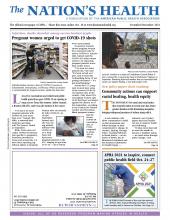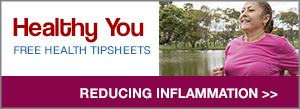
People can learn how to find trustworthy health information online with a suite of tools from library groups and All of Us.
Photo by RichVintage, courtesy iStockphoto
The All of Us Research Program is partnering with libraries across the country to help people hone their digital health literacy skills.
Last year, All of Us — a National Institutes of Health program to build one of the most diverse health datasets in history — along with the National Network of Libraries of Medicine and Public Library Association, released a new suite of digital literacy tools that libraries can use to teach residents how to find trustworthy health information online. The tools run the gamut, from basic internet competencies such as getting a free email address and creating a strong password, to tips for teasing out the good health information from the bad.
Healthy People 2030, which guides the nation’s health objectives, defines personal health literacy as the ability to find, understand and use information for health-related decisions. The skill — the importance of which became even more evident during the COVID-19 pandemic and vaccination campaign — is considered a key social determinant of health. Research has found considerable disparities on the issue, with low health literacy more prevalent among older adults, men, racial and ethnic minorities, and people with low incomes.
Scott Allen, MS, deputy director of the Public Library Association, said libraries are especially well-suited to help close those gaps.

Libraries can help people learn vital health literacy skills.
Photo by Baona, courtesy iStockphoto
“Public libraries are great places to educate people on just about everything,” Allen told The Nation’s Health, noting public libraries are both trusted members of their communities and accessible. “Interest in health information is definitely rising, especially this year.”
Among the free tools is a curriculum guide to help librarians teach digital literacy by using health topics and a series of modules that cover basic competencies such as establishing an email address, picking good passwords, keeping personal information safe and avoiding online scams.
The modules, available in English and Spanish, also offer tips on how and where to find reliable health information online and explain how to use MedlinePlus, a hub of reliable information produced by the National Library of Medicine. As a tie-in to All of Us, one of the modules discusses how the program protects the personal information of its participants.
“Libraries have a big equity mission, as does All of Us, so it’s a natural partnership,” Allen said.
Libraries are also working with All of Us and other partners to promote “citizen science” activities, which aim to engage the public in scientific research, from monitoring air and water quality to tracking and identifying wildlife.
Resources include free citizen science guides and an online tutorial. “The Library and Community Guide to Citizen Science,” available online, highlights local citizen science initiatives, provides detailed tips for planning virtual events and shares ideas.
“Citizen science is a really useful strategy for making connections between digital literacy and health literacy,” said Brittney Thomas, MLAS, associate director of the All of Us Community Engagement Center at the University of Iowa. “It builds on what libraries are already doing on digital literacy and connects back to teaching people how to use scientific information online.”
Thomas said that in surveys of people who take the “Foundations of Citizen Science” online tutorial, a majority said it increased their awareness and interest in citizen science. Such activities can also open the door to broader conversations about what scientific research entails and how All of Us works, she said.
“Public libraries are very trusted spaces in the community, so they’re perfect partners for this kind of work,” Thomas told The Nation’s Health.

When people have high levels of health literacy, they are better able to follow instructions related to their personal health.
Photo by Tigercat_LPG, courtesy iStockphoto
For more information, visit https://allofus.nnlm.gov/digital-health-literacy.
- Copyright The Nation’s Health, American Public Health Association












